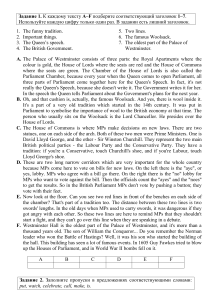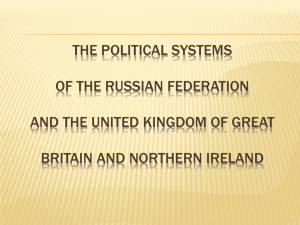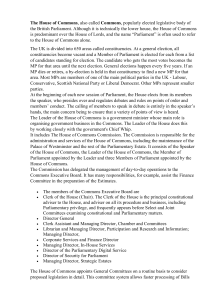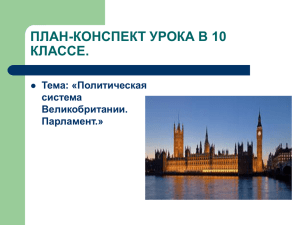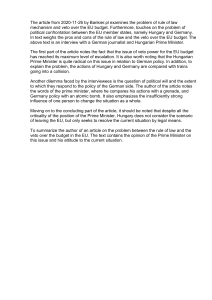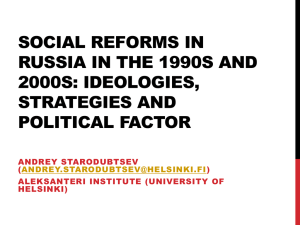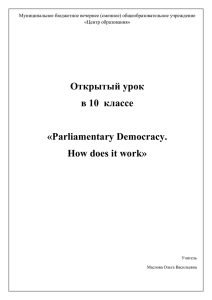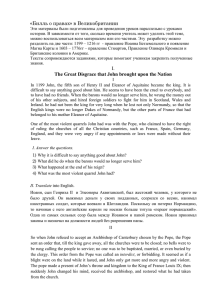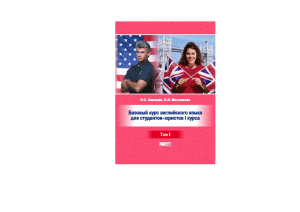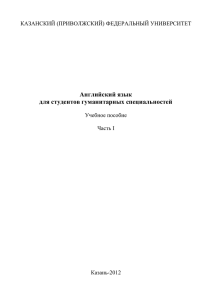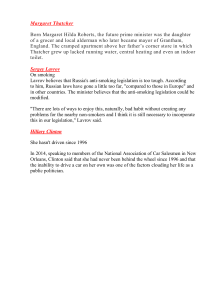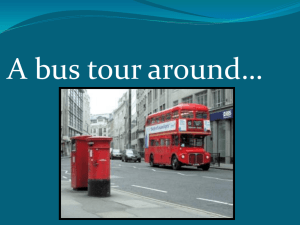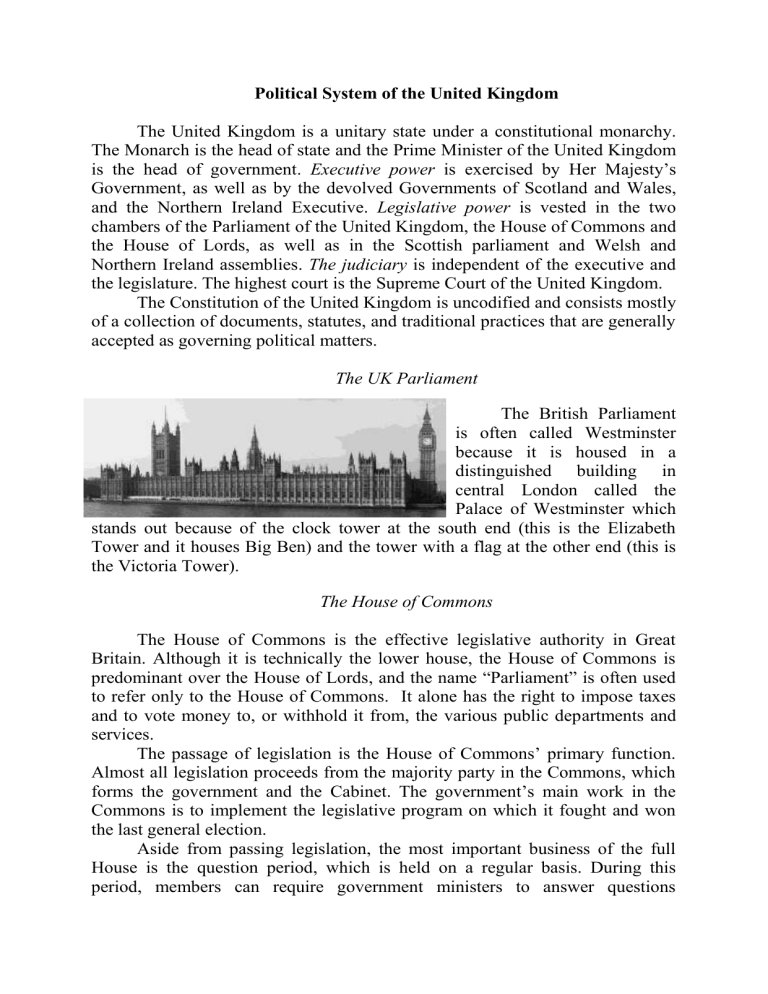
Political System of the United Kingdom The United Kingdom is a unitary state under a constitutional monarchy. The Monarch is the head of state and the Prime Minister of the United Kingdom is the head of government. Executive power is exercised by Her Majesty’s Government, as well as by the devolved Governments of Scotland and Wales, and the Northern Ireland Executive. Legislative power is vested in the two chambers of the Parliament of the United Kingdom, the House of Commons and the House of Lords, as well as in the Scottish parliament and Welsh and Northern Ireland assemblies. The judiciary is independent of the executive and the legislature. The highest court is the Supreme Court of the United Kingdom. The Constitution of the United Kingdom is uncodified and consists mostly of a collection of documents, statutes, and traditional practices that are generally accepted as governing political matters. The UK Parliament The British Parliament is often called Westminster because it is housed in a distinguished building in central London called the Palace of Westminster which stands out because of the clock tower at the south end (this is the Elizabeth Tower and it houses Big Ben) and the tower with a flag at the other end (this is the Victoria Tower). The House of Commons The House of Commons is the effective legislative authority in Great Britain. Although it is technically the lower house, the House of Commons is predominant over the House of Lords, and the name “Parliament” is often used to refer only to the House of Commons. It alone has the right to impose taxes and to vote money to, or withhold it from, the various public departments and services. The passage of legislation is the House of Commons’ primary function. Almost all legislation proceeds from the majority party in the Commons, which forms the government and the Cabinet. The government’s main work in the Commons is to implement the legislative program on which it fought and won the last general election. Aside from passing legislation, the most important business of the full House is the question period, which is held on a regular basis. During this period, members can require government ministers to answer questions regarding their departments; it thus provides the opposition with an opportunity to attack government policy. The House of Commons is chaired by the Speaker, who presides over and regulates debates and rules on points of order and members’ conduct. The House of Commons currently comprises 650 Members of Parliament or MPs (the number varies slightly from time to time to reflect population change). Each member in the House of Commons represents a geographical constituency. Every citizen aged 18 or over can vote once in the constituency in which they live. Voting is not compulsory. The House of Lords This is the upper chamber but the one with less authority. Its main roles are to revise legislation and keep a check on Government by scrutinising its activities. The most useful functions of the House of Lords are the revision of bills that the House of Commons has not formulated in sufficient detail and the first hearing of noncontroversial bills that are then able, with a minimum of debate, to pass through the House of Commons. There is no fixed number of members in the House of Lords, but currently there are 826 members. Historically most members of the House of Lords had been hereditary peers. This meant that years ago a king or queen used to nominate a member of the aristocracy to be a member of the House and, since then, the right to sit in the House had passed through the family from generation to generation. However in 1999 the Labour Government abolished the right of all but 92 of these hereditary peers to sit in the House. Almost all the other members of today’s House of Lords are life peers. This means that they have been chosen by the Queen, on the advice of the Government, to sit in the House for as long as they live, but afterwards no member of their family has the right to sit in the House. Almost 200 are former Members of Parliament. Others are distinguished figures in fields such as education, health and social policy. A small number of other members - 26 - are archbishops and bishops of the Church of England. The Legislative Process At the beginning of each annual session of the Parliament, the main Bills to be considered are announced by the Queen in a speech opening that year’s session of Parliament. All legislation has to be approved by both Houses of Parliament. In each House of Parliament, a proposed piece of legislation – called a Bill – goes through the following stages: First Reading – the Bill is introduced with simply a reading by a Minister of the long title of the Bill Second Reading – the general principles of the Bill are debated by all the members of the House and a formal vote is taken Committee Stage – each clause and schedule of the Bill, plus amendments to them and any new clauses or schedules, is examined in detail, in the Commons by a small, specially chosen group of members meeting as Public Bill Committee or in the Lords by the members as a whole on the floor of the House Report Stage – the changes made to the Bill in the Committee are reported to and debated by the whole House which is invited to consider the Bill as a whole, approve the changes by the Committee, and consider any further proposed changes that might be suggested Third Reading – the final version of the Bill is considered by the whole House in a short debate Royal Assent – the Crown gives assent to the Bill which then becomes an Act. The House of Lords debates legislation, and has power to amend or reject bills. However, the power of the Lords to reject a bill passed by the House of Commons is severely restricted by the Parliament Acts. Under those Acts, certain types of bills may be presented for the Royal Assent without the consent of the House of Lords (i.e. the Commons can override the Lords’ veto). The House of Lords cannot delay a money bill (a bill that, in the view of the Speaker of the House of Commons, solely concerns national taxation or public funds) for more than one month. The UK Government The position of Prime Minister, the UK’s head of government, belongs to the person most likely to command the confidence of the House of Commons; this individual is typically the leader of the political party or coalition of parties that holds the largest number of seats in that chamber. The Prime Minister chooses a Cabinet and its members are formally appointed by the monarch to form Her Majesty’s Government. By convention, the Queen respects the Prime Minister’s decisions of government. The Cabinet is traditionally drawn from members of the Prime Minister’s party or coalition and mostly from the House of Commons but always from both legislative houses, the Cabinet being responsible to both. For five years, the UK had its first coalition government in 65 years when, in May 2010, the Conservatives went into coalition with the Liberal Democrats because in the General Election they did not secure a majority of the seats. In this coalition, the Lib Dems had 17 ministers led by the Deputy Prime Minister Nick Clegg. However, at the General Election of May 2015, the Conservative Party won an overall majority and the normal arrangement resumed of all Ministers coming from the same party. The Conservative Party, the Labour Party and the Liberal Democrats (formerly as the Liberal Party) have, in modern times, been considered the UK’s three major political parties, representing the British traditions of conservatism, socialism and social liberalism, respectively. However, at the 2015 general election, the Scottish National Party became the third-largest party by number of seats won, ahead of the Liberal Democrats. The UK Judiciary The British judicial branch is extremely complex. Unlike most countries which operate a single system of law, the UK operates three separate legal systems: one for England and Wales, one for Scotland, and one for Northern Ireland. Although bound by similar principles, these systems differ in form and the manner of operation. Essential Vocabulary a unitary state a constitutional monarchy legislation legislative power executive power judiciary (judicial power) authority predominant to impose taxes to withhold smth from smb a majority party a government the Cabinet the Prime Minister question period to chair the House of Commons the House of Lords a constituency the Royal Assent a bill a hereditary peer a life peer a distinguished figure an amendment to amend to scrutinise унитарное государство конституционная монархия законодательство законодательная власть исполнительная власть судебная власть полномочие, влияние преобладающий облагать налогами удерживать, не предоставлять партия большинства правительство кабинет министров премьер-министер рассмотрение вопросов председательствовать Палата общин Палата лордов избирательный округ королевская санкция законопроект, билль наследственный пэр пожизненный пэр выдающаяся фигура поправка вносить поправки изучать to override the veto to delay a bill a coalition government отклонить вето отложить билль коалиционное правительство Language Focus Ex.1 Fill in the words from the list, then make sentences using the completed phrases: annual, distinguished, power, life, ministers, monarchy, peers, coalition, legislative, constituency 1. 2. 3. 4. 5. ………………….. authority ……………….. government ……………...….….building ………………….…… peers …………………..… session 6. executive …………………….. 7. constitutional ………………... 8. hereditary ……………………. 9. government …………….…..… 10.geographical …………………. Ex.2 Complete the sentences by using the correct form of the given verbs: to delay, to impose, to withhold, to amend, to override, to scrutinise, to chair 1. The House of Lords ______________ bills that have been approved by the House of Commons. 2. The Clerk of the House ______________ the Board of Management, which consists of the heads of six departments. 3. The Commons can ______________the Lords’ veto. 4. The new income tax was ______________ on incomes above £150. 5. The last Stuart monarch, Anne, ______________ on 11 March 1708 her assent from a bill for the settling of Militia in Scotland. 6. The Lords may not ______________ a money bill for more than one month. 7. The committee can only accept or reject the measures placed before it; it does not have the power to ______________ them. Ex.3 Fill in the correct word derived from the word in brackets as in the example. Margaret Thatcher Baroness (baron) Margaret Thatcher, the “Iron Lady”, was the first ……………………. (male) British Prime Minister and the longest serving PM for over 150 years. When she became PM many people in Britain wondered whether a woman would be ……………………. (strength) enough to do this very ……………………. (demand) job. She showed them the answer to that question was “yes”. When women become leaders of countries, they are often ……………………. (comparison) to Margaret Thatcher, even when they are really very ……………………. (differ) people. Her first years in office were not easy - ……………………. (employ) was very high, but the economy ……………………. (gradual) showed ……………………. (improve). She brought more of her ……………………. (support) into the Cabinet, and added to her ……………………. (repute) by leading the country to war against Argentina in the Falkland Islands. Her ……………………. (govern) followed a radical programme of ……………………. (privatise) and deregulation, reform of the trade unions, ……………………. (taxable) cuts and the ……………………. (introduce) of market ……………………. (mechanize) into health and ……………………. (educated). The aim was to ……………………. (reduction) the role of government and increase individual self-……………………. (rely). She also became a ……………………. (familiarise) figure internationally, creating a famous ……………………. (friendly) with US President Reagan and gaining the ……………………. (appraise) of Soviet ……………………. (lead) Gorbachev. She left the House of Commons in 1992, and was appointed a life ……………………. (peer) in the House of Lords in the same year, receiving the ……………………. (entitled) of Baroness Thatcher of Kesteven. In 1995 she was appointed as Lady Companion of the Order of the Garter, the highest order of Chivalry in the UK. Ex.4 Fill in the gaps with the suitable words from the list below: remain decades resigned currencies respect merging rights dubbed business turnout shorthand vote What does Brexit mean? Brexit is a word that has become used as a ______________ way of saying the UK leaving the European Union - ______________ the words Britain and exit to get Brexit, in the same way as a possible Greek exit from the euro was ______________ Grexit in the past. A referendum – a ______________ in which everyone of voting age can take part – was held on 23rd June 2016 to decide whether the UK should leave or ______________ in the European Union. “Leave” won by 52% to 48%. The referendum ______________ was 71.8%, with more than 30 million people voting. England voted for Brexit, by 53.4% to 46.6%, as did Wales, with “Leave” getting 52.5% of the vote and “Remain” 47.5%. Scotland and Northern Ireland both backed staying in the EU. Scotland backed “Remain” by 62% to 38%, while 55.8% in Northern Ireland voted “Remain” and 44.2% “Leave”. The referendum roiled global markets, including ______________, causing the British pound to fall to its lowest level in ______________. Prime Minister David Cameron, who supported the United Kingdom remaining in the European Union, ______________ on July 13 as a result. Home Secretary Theresa May, leader of the Conservative Party, became Prime Minister. Like Mr Cameron, Mrs May was against Britain leaving the EU but she says she will ______________ the will of the people. She has said “Brexit means Brexit” but there is still a lot of debate about what that will mean in practice especially on the two key issues of how British firms do ______________ in the European Union and what rules are brought in on the ______________ of European Union nationals to live and work in the UK. Reading Comprehension Ex.1 Read the text “Political System of the United Kingdom” and give extensive answers to the following questions based on the text. 1. How is the concept of separation of powers applied in the United Kingdom? 2. What are the main functions of the House of Commons? 3. What is the structure of the House of Commons? 4. What members does the House of Lords comprise? 5. In what way are the functions of the House of Lords different from those of the House of Commons? 6. What is the process of passing a Bill in the Parliament? 7. How is the Сabinet formed? 8. What are the major political parties in the United Kingdom? Additional Reading UK Parliament: Traditions … The British Parliament is one of the oldest parliamentary systems in the world, and foreigners are often puzzled by some of its ancient customs. A tradition that stands out to most visitors to Parliament is the difference between the colours which are used in the Lords and Commons parts of the building. Green is the principal colour for furnishing and fabrics throughout the House of Commons, with the green benches of the Chamber perhaps the most recognisable of these. In the House of Lords, red is similarly employed in upholstery, notepaper etc. This colour most likely stems from the use by monarchs of red as a royal colour and its consequent employment in the room where the Monarch met their court and nobles. Each sitting in both Houses begins with prayers that follow the Christian faith. In the Commons the Speaker’s Chaplain usually reads the prayers. In the Lords a senior bishop who sits in the Lords usually reads the prayers. The Woolsack is the seat of the Lord Speaker in the House of Lords Chamber. The Woolsack is a large, wool-stuffed cushion or seat covered with red cloth. The tradition of the Woolsack originated in the 14th century when wool was a symbol of Britain’s prosperity. When a new Speaker of the House of Commons is chosen, he or she is dragged to the chair, pretending to resist. Why the resistance? It’s a symbolic show of hesitation. Becoming Speaker of the House of Commons was once similar to signing your own death warrant. In the early days of the English Parliament, speakers usually had to deliver any bad news to the king, such as a refusal to raise taxes. Some monarchs were less than charitable in their reactions. Nine speakers were beheaded between 1394 and 1535. Therefore, as you can imagine, previous Speakers required some gentle persuasion to accept the post. … and Changes Lord’s Proposal for a Lower Voting Age Conservative peer Lord Lucas of Crudwell and Dingwall has proposed a new voting age of 16, and a campaign supporting his Bill has been launched at the Houses of Parliament. The Votes at 16 Campaign is backed by a wide range of political and youth groups, and the reformers have a strong case. At sixteen, they argue, young people can leave school, marry (without parental consent in Scotland), be company directors, be tried in a Crown Court and join some sections of the armed forces. Peers Stand in Lords By-election A former soldier, a businessman and the great grandson of the former Prime Minister are among the 7 candidates standing in the House of Lords byelection on 19 April 2016, following the death in February of hereditary peer Eric Reginald Lubbock, 4th Baron Avebury. Baron Avebury was one of 92 peers with inherited titles allowed to stay in the Parliament after the passing of the House of Lords Act in November 1999, when more than 600 dukes, marquesses, earls, viscounts and barons lost their hereditary right to a seat in the House. The 92 hereditary peers were allowed to stay as a concession to the opposition and the government agreed that any of the 92 who dies would be replaced in a by-election. Ex.1 Read the texts about traditions and changes in the British Parliament and choose the correct alternatives in the statements below. 1. According to the tradition green is a) the only colour allowed in the furnishing, b) the predominant colour in the furnishing, c) used only in the upholstery of the benches of the House of Commons. 2. The Woolsack is used in the House of Lords to show that a) the wool trade was one of the most important parts of the economy, b) Britain is the most prosperous country in the world, c) the wool production is still the most important branch of economy. 3. A newly elected Speaker of the House of Commons is physically pulled to the Chair because a) it is quite a dangerous post, b) no one wants to be a Speaker, c) in the past Speakers faced execution if they brought the king bad news. 4. Lord Lucas wants young people to a) vote, b) get married, c) start their own business at the age of 16. 5. His supporters think that young people at the age of 16 should start doing this because: a) they already have a lot of responsibilities, b) lowering the voting age will increase voter turnout, c) they are extremely interested in politics. 6. In 1999, the seats in the Parliament were taken away from a) 92 hereditary peers, b) only marquesses and barons, c) almost all hereditary peers. 7. On the death of a sitting hereditary peer a) their son inherits their position, b) an election is held in the Parliament, c) their position in the Parliament disappears. Ex.2 Look at the information about the voter turnout in British elections. In your opinion, why do the statistics look like this? British voter turnout General elections 2010 2015 65% 66% Local elections (England) 2014 2015 37,5% 64% European Parliament Elections 2009 2014 34,5% 35% Ex.3 You are going to listen to an interview of a correspondent with two young British people talking about politics. Listen and answer the following questions: 1. 2. 3. 4. 5. How old are these young people? What is their attitude to politics? Are they interested in it? Have they ever taken part in the elections? Are they going to vote in the local elections? Do they have the same opinion on lowering the voting age?
